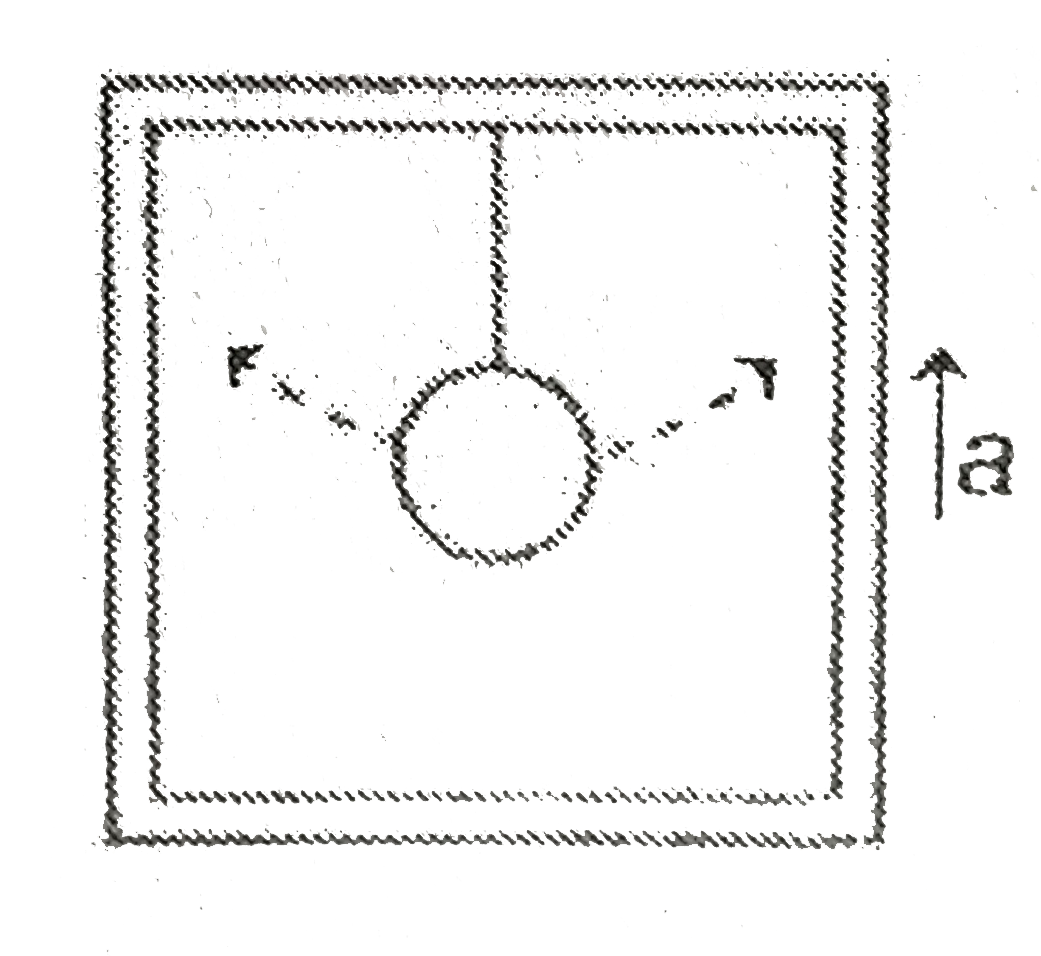Time period of a simple pendulum in a freely falling lift will be
Finite
Inifinite
Zero
All of these
The correct Answer is:2
To find the time period of a simple pendulum in a freely falling lift, we can follow these steps:
Step 1: Understand the formula for the time period of a simple pendulum
The time period T of a simple pendulum is given by the formula:
T=2π√Lgeffective
where L is the length of the pendulum and geffective is the effective acceleration due to gravity.
Step 2: Analyze the situation in a freely falling lift
In a freely falling lift, the lift is accelerating downwards with an acceleration equal to g (the acceleration due to gravity). Therefore, the effective gravitational force acting on the pendulum becomes zero.
Step 3: Determine the effective gravity
In the freely falling lift:
- The weight of the pendulum mg acts downwards.
- A pseudo force ma acts upwards, where a=g (the acceleration of the lift).
Since both forces are equal in magnitude but opposite in direction, the net force acting on the pendulum is:
Fnet=mg−mg=0
This means that the effective gravitational acceleration geffective is zero.
Step 4: Substitute geffective into the time period formula
Now substituting geffective=0 into the time period formula:
T=2π√L0
Since division by zero is undefined, we conclude that the time period T approaches infinity.
Step 5: Conclusion
Thus, the time period of a simple pendulum in a freely falling lift is infinite.
Final Answer
The time period of a simple pendulum in a freely falling lift will be infinite.
---
The time period T of a simple pendulum is given by the formula:
T=2π√Lgeffective
where L is the length of the pendulum and geffective is the effective acceleration due to gravity.
In a freely falling lift, the lift is accelerating downwards with an acceleration equal to g (the acceleration due to gravity). Therefore, the effective gravitational force acting on the pendulum becomes zero.
In the freely falling lift:
- The weight of the pendulum mg acts downwards.
- A pseudo force ma acts upwards, where a=g (the acceleration of the lift).
Fnet=mg−mg=0
This means that the effective gravitational acceleration geffective is zero.
Now substituting geffective=0 into the time period formula:
T=2π√L0
Since division by zero is undefined, we conclude that the time period T approaches infinity.
Thus, the time period of a simple pendulum in a freely falling lift is infinite.
The time period of a simple pendulum in a freely falling lift will be infinite.
Topper's Solved these Questions
- OSCILLATIONSBOOK - AAKASH INSTITUTE ENGLISHCHAPTER - OSCILLATIONSEXERCISE - ASSIGNMENT (SECTION-B )
25 Videos
- OSCILLATIONSBOOK - AAKASH INSTITUTE ENGLISHCHAPTER - OSCILLATIONSEXERCISE - ASSIGNMENT ( SECTION-C )
11 Videos
- OSCILLATIONSBOOK - AAKASH INSTITUTE ENGLISHCHAPTER - OSCILLATIONSEXERCISE - Try Yourself
86 Videos
- NUCLEIBOOK - AAKASH INSTITUTE ENGLISHCHAPTER - NUCLEIEXERCISE - ASSIGNMENT (SECTION-D)
10 Videos
- PHYSICAL WORLDBOOK - AAKASH INSTITUTE ENGLISHCHAPTER - PHYSICAL WORLDEXERCISE - ASSIGNMENT (Section-B)
4 Videos
Similar Questions
The time period of a simple pendulum inside a stationary lift is √5 s. What will be the time period when the lift moves upward with an acceleration g4?
View SolutionTime period of a simple pendulum inside a satellite orbiting earth is
View SolutionHow is the time period of a simple pendulum affected, if at all, in the following situation
the length is made four times.
View SolutionHow is the time period of a simple pendulum affected, if at all, in the following situations: The acceleration due to gravity is reduced to one-fourth
View SolutionThe time period of a simple pendulum of length 9.8 m is
View SolutionThe time period of simple pendulum inside a stationary lift is T. If lift starts accelerating upwards with the acceleration of g/2, then the new time period of the simple pendulum will be
View SolutionThe time period of a seconds' pendulum :
View SolutionA scientist measures the time period of a simple pendulum as T in a lift at rest. If the lift moves up with accelerationi as one fourth of the acceleratioin of gravity, the new time period is

View SolutionThe time period of a simple pendulum is T remaining at rest inside a lift. Find the time period of pendulum when lift starts to move up with an acceleration of g/4
View SolutionHow would the time period of a simple pendulum be affected if (a) the length is doubled (b) the amplitude is doubled ?
View Solution
